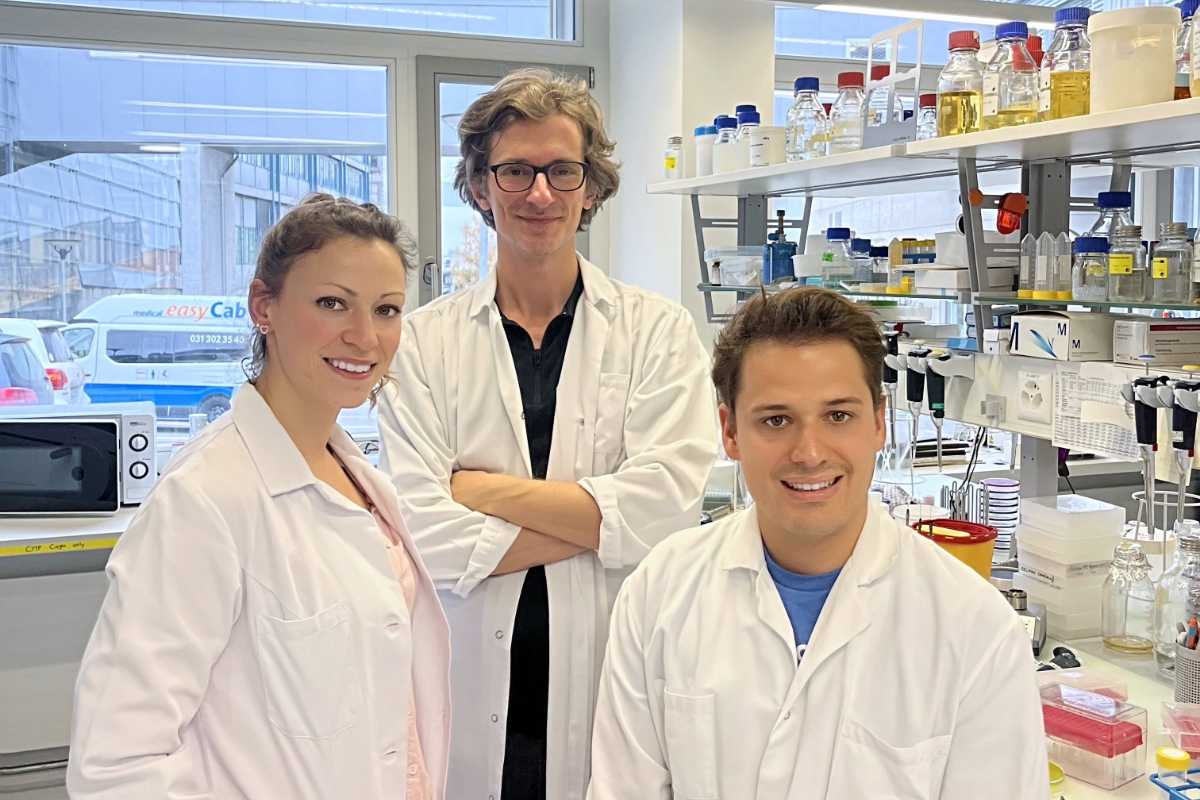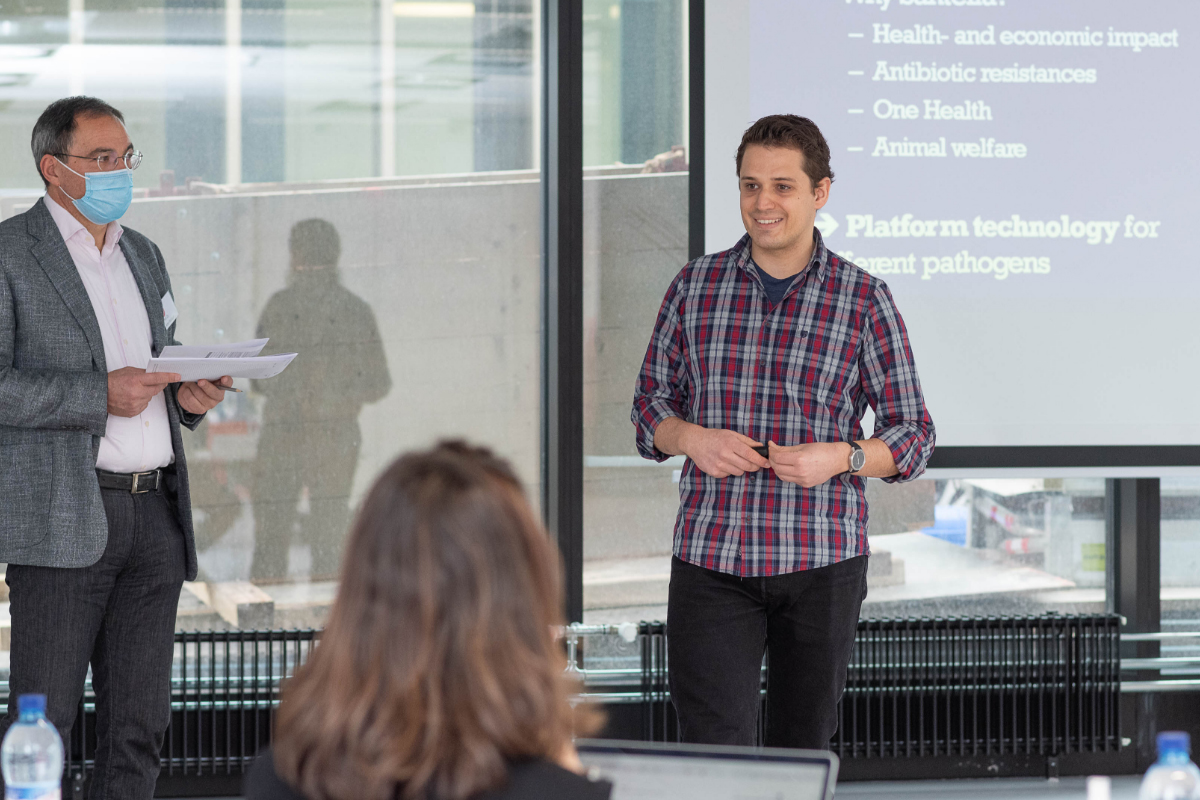With his start-up Santella, Olivier Schären is developing a new type of vaccine against one of the world's most harmful poultry diseases. He is one of four young researchers who are being supported as part of the Venture Fellowship Programme of the Innovation Office of the University of Bern to make the leap into entrepreneurship.
Interview: Jennifer Berger
Read the original uniAKTUELL article here.
Olivier Schären, what do you do at Santella?
We are developing a vaccine against the bacterium "Avian Pathogenic Escherichia Coli" - APEC for short - which can lead to serious infections in the intestines of poultry. These infections are currently treated primarily with antibiotics. As a result, the majority of isolated APEC strains are already resistant to antibiotics. The pathogen also has the potential to become dangerous for humans if it ends up in the food chain.
What are the benefits of the vaccine?
On the one hand, it is fundamentally better to vaccinate animals than to have to treat them with antibiotics once the disease has broken out. This is because the excessive and unspecific use of antibiotics leads to the development of dangerous antibiotic resistance - which, according to the World Health Organisation, is one of the greatest risks facing our societies worldwide. Our vaccine is also intended to be administered to the animals via their drinking water, thus targeting the place where APEC infections originate: the intestine.
How serious is the disease for the poultry industry?
It is estimated that around a third of all poultry flocks are affected by APEC every year. In total, this amounts to over 10 billion animals worldwide. The treatment costs and the high mortality rate lead to major financial losses in livestock farming.
What made you decide to take the plunge into entrepreneurship?
I did the basic research on this during my doctoral thesis. So that all the findings don't just gather dust somewhere, my team and I thought about which problem could be solved with a practical application. So you could say that we approached it the other way round - starting with the solution and working towards the problem.
How did you go about finding the problem?
The first idea was to develop a vaccine against salmonella infections in poultry. I had already worked with salmonella and could have brought a lot of experience to the table. However, a market survey showed that this was no longer really in demand. In the 1990s it would have been the drug of the hour, but today the problem is under control in Central Europe. At the same time, however, we discovered that APEC was a major problem for the poultry sector and then switched to it.

So are other applications also conceivable?
Yes, we see our approach as a platform technology. This means that we could potentially also use it for other pathogens and other animals. Even applications in human medicine are conceivable.
Would you have thought at the beginning of your academic career that you would one day become an entrepreneur?
No, not at all. In the academic world, it's all about publishing studies. In my opinion, there is far too little talk about entrepreneurship at universities. Fortunately, something is slowly happening. For example, the Innovation Office has been a contact point at the University of Bern for a year now. My wish would be that all doctoral students would have to attend a course in entrepreneurship.
What do you think are the biggest differences to science?
I am always amazed at how different academia and entrepreneurship are. If a scientist wants to publish a study, researchers in the same field scrutinise it thoroughly first. What is not convincing is not published. And now, as entrepreneurs, we are treated very uncritically at a technical level - especially if we are convincing enough. These are two different worlds - as a researcher, I remain sceptical.

You are not alone on your journey. How important is the team around you?
Very important. I probably couldn't do it on my own. On the one hand, I'm trained as a scientist and need support when it comes to business issues. On the other hand, my colleague Sabrina Stöckli is the creative one of the two of us and transforms my slides with boring data sets into appealing presentations that are understandable for a lay audience. We complement each other very well here.
You have just received further funding. What happens now?
As part of the Tech Transfer Initiative of the National Centre of Competence in Research Microbiomes, which is based at the University of Lausanne, we have received 200,000 Swiss francs for two years. Together with the support of the Venture Fellowship, this will allow us to continue working on the project and give us time to find more money. We were also able to enter into a partnership with the Institute of Virology and Immunology of the Federal Food Safety and Veterinary Office (FSVO). They are supporting us with the trials and are also covering the costs.
What are your goals and where do you see yourself in a few years?
We are currently working on the proof of concept - in other words, we are conducting a feasibility study. A solid data situation is the cornerstone for a successful project. Once this has been done, we want to set up a public limited company. We will then have to make an investment round in order to be able to finance the clinical trials.
Would you apply for the UniBE Venture Fellowship again today?
Yes, absolutely! After all, it's also a vehicle where competition is not quite as fierce as with other grants - not yet! The fellowship is a good instrument for promoting Bern and the University of Bern. I can recommend everyone to consider applying.
ABOUT THE PERSON
Olivier Schären completed his doctorate at the Institute of Infectious Diseases (IFIK) at the University of Bern in 2021 and has been working as a research associate at the same institute ever since. He also holds a Bachelor's degree in Biology and a Master's degree in Molecular Life Sciences from the University of Bern.
TO THE STARTUP
The Santella team led by Olivier Schären and Sabrina Stöckli is developing a genetically modified live vaccine to combat coli bacteria (E. coli) in poultry. With the spin-off project Santella, Olivier Schären and his team now want to develop a new vaccine, the basis of which he researched during his doctorate. In doing so, they are also making an important contribution to the fight against antibiotic resistance.
TO THE PROGRAMME
Unibe Venture Fellowship
The Innovation Office of the University of Bern offers its own funding programme, the UniBE Venture Fellowships. Each year, this programme supports two to four young researchers who want to take their first steps towards entrepreneurship and turn their scientific findings into innovative products and services at the University of Bern. The aim of the fellowships, each worth up to CHF 100,000, is to continue the applied research on which the innovation is based in order to validate the technical feasibility (proof of concept) of an innovative solution and prepare it for commercialisation.